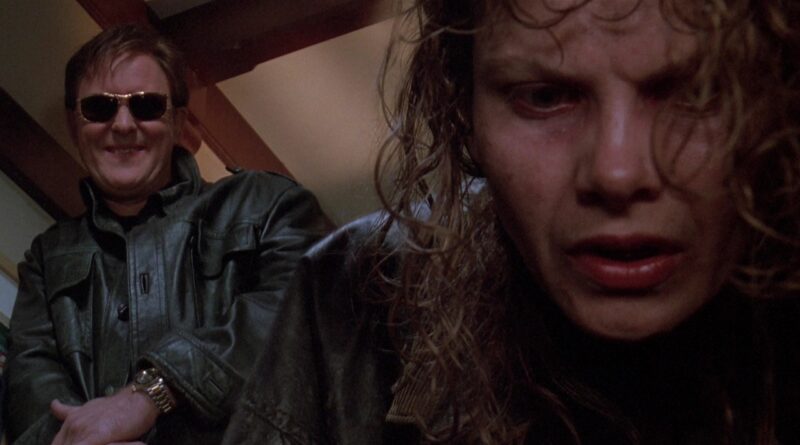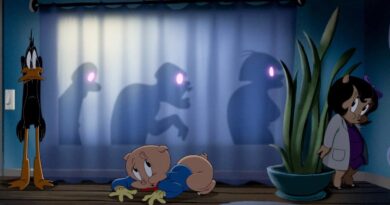Raising Cain (1992)
After a near decade-long foray into other genres, Brian De Palma returns to the Hitchcockian thriller with Raising Cain. But for something meant to be a return, I was expecting far better; despite some technical mastery, decent performances, and several instances of suspenseful pacing, the plot is confusing, prone to canyon-sized gaps in logic, and ultimately so ridiculous that, with a little reworking of the screenplay, it could have been a rather funny parody. It plays as if De Palma wants us to take everything at face value, hoping we would ignore the many, many intricacies and logistics he seems to have intentionally avoided. At just over ninety minutes, the film is too short. It needed at least an extra fifteen minutes, if not to add credibility, then at least to answer several lingering questions.
When in full Hitchcock mode – as he was with Obsession, Dressed to Kill, and Body Double – De Palma often turns to Rear Window and Vertigo as sources of inspiration. With Raising Cain, he turns to … but no, I don’t think I should reveal the cinematic source. Knowing that bit of information would be enough to spoil the movie. I’ll say this: While the source film hid its secrets very well, Raising Cain hides them poorly. So poorly, in fact, that we can figure out the twists as early as the very first scene. When the movie is over, we also think back on the progression of scenes and realize that, on a purely logistical level, the twists would not be possible. In a parody, this could be forgiven, since, obviously, the point is merely to make us laugh. But when the aim is for the material to be taken seriously, real work must go into surprising the audience.
Even though the twists are staring us directly in our faces, I’ll do my duty as a film critic and describe what little of the plot I can without giving anything crucial away. John Lithgow has been cast in several roles: (1) Mild-mannered child psychologist Carter Nix; (2) Carter’s foulmouthed, cigarette-smoking, homicidal identical twin brother Cain; (3) their Norwegian father, also a child psychologist, who was said to have committed suicide twenty years ago after his unethical methods got him both discredited and arrested. The brothers, but mostly Cain, are helping their father continue his cruel research by murdering mothers and kidnapping their children. Strange, how little we see of this happening. In fact, in the course of this movie, I recall seeing just two murders and one kidnapping.
Stranger still, that Carter’s wife Jenny (Lolita Davidovich) would confide to a friend on a park bench that Carter seems unusually attached to their young daughter. “He doesn’t just take care of her,” she says. “He studies her.” The problem is that we never see such a strong level of attachment. If anything, all scenes between Carter and his daughter, an adorable little girl named Amy (Amanda Pombo), show nothing but a happy child and a loving, attentive father spending time together. Granted, scenes of them together are very, very few. Part of the extra fifteen minutes I suggested should have been spent actually showing us this compulsive studying.
Jenny, an oncologist, stars in her own subplot involving a darkly handsome old flame named Jack (Steven Bauer), who comes back into her life quite unexpectedly. How they came to know each other in the first place doesn’t paint either of them in the most flattering light. Neither, for that matter, do their actions after reuniting, including an unnecessary interlude in which Jenny accidentally gifts two alarm clocks to the wrong people. Not that it’s of any importance; both characters, but Jack especially, are a narrative means to an end, convenient targets for the Nix family – but again, mostly for Cain – to pin their crimes on. At a certain point, you’re likely to forget about Jack altogether. I forgive you in advance.
The only praise I can muster for Raising Cain would be for the performances of Lithgow, a very versatile actor, and for De Palma’s Hitchcockian camerawork. In one especially well-choreographed scene reminiscent of Notorious, a single uninterrupted shot follows three characters down a police station hall, into an elevator, down a flight of stairs, and into an autopsy room, where the horrific expression frozen on the face of a murder victim is revealed with macabre gleefulness. But the plot just wasn’t thought through. We’re left with more questions than answers, and at times, we wonder if De Palma should have been aiming for a spoof. The final shot best exemplifies this. Watching it, I couldn’t help but let out a small chuckle.




